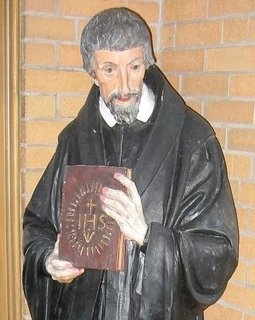 O God, Who did strengthen blessed Peter Thy Confessor, in virtue and learning for the defense of the Catholic faith: mercifully grant that through his examples and teaching, those who are in error may be brought back to salvation and that the faithful may persevere in the confession of the truth.
O God, Who did strengthen blessed Peter Thy Confessor, in virtue and learning for the defense of the Catholic faith: mercifully grant that through his examples and teaching, those who are in error may be brought back to salvation and that the faithful may persevere in the confession of the truth.
Jesuit Father John Hardon's brief note on Saint Peter Canisius
On the third centenary of the death of the Saint Peter Canisius, Pope Leo XIII wrote to the Bishops of Austria, Germany and Switzerland:
7. This is not the place to recall in detail the life of this man, so eminent in sanctity; the zeal with which he labored to restore harmony and union to his country torn by dissension and revolt; the ardor of his public debates with the teachers of error; his inspiring sermons; the persecutions he suffered; the many countries he travelled through; and the difficult missions he undertook in the interest of the faith. However, to return to the weapons of knowledge which we have mentioned: how constantly, readily, wisely and fitly he employed them! Upon his return from Messana where he went as a teacher of rhetoric, he committed himself to the teaching of the sacred sciences in the academies of Cologne, Ingolstadt and Vienna. Here he followed the royal road of the most approved learned men of the Christian school and revealed to the Germans the treasures of scholastic philosophy. As this philosophy was shunned at that time by the enemies of the faith because it was a great support of Catholic truth, he had it taught publicly in the schools and colleges of the Society of Jesus for whose establishment he had worked so hard.
8. He did not hesitate to descend from the heights of wisdom to the basics of writing. He undertook the instruction of children and even composed elementary writing books and grammars for their use. Indeed, just as he often came back from preaching to the courts of kings to address the people, so, after learned writings on dogma or morals, he used to compose pamphlets destined either to strengthen the faith of the people or to
 arouse and nourish their piety. He had wonderful success in preventing the inexperienced from getting caught in the nets of error. The Summa which he published for this purpose is a compact and tightly-knit work, written in beautiful Latin and not unworthy of the Fathers of the Church. This remarkable work was enthusiastically received by learned men in almost all the countries of Europe. Less voluminous, but no less useful, were the two famous catechisms which this blessed man wrote for less cultivated minds: one for the religious instruction of children, the other for young men already involved in the study of the arts. These two works had such a great success among Catholics immediately upon publication, that almost all professors charged with teaching the basics of the faith had them in hand. They were used not only in the schools as a spiritual milk for the children, but they were also explained publicly in the churches to the benefit of all. Thus, during three centuries Canisius has been regarded as the teacher of Catholics in Germany. In popular speech, "knowing Canisius" was synonymous with "preserving the Christian faith."
arouse and nourish their piety. He had wonderful success in preventing the inexperienced from getting caught in the nets of error. The Summa which he published for this purpose is a compact and tightly-knit work, written in beautiful Latin and not unworthy of the Fathers of the Church. This remarkable work was enthusiastically received by learned men in almost all the countries of Europe. Less voluminous, but no less useful, were the two famous catechisms which this blessed man wrote for less cultivated minds: one for the religious instruction of children, the other for young men already involved in the study of the arts. These two works had such a great success among Catholics immediately upon publication, that almost all professors charged with teaching the basics of the faith had them in hand. They were used not only in the schools as a spiritual milk for the children, but they were also explained publicly in the churches to the benefit of all. Thus, during three centuries Canisius has been regarded as the teacher of Catholics in Germany. In popular speech, "knowing Canisius" was synonymous with "preserving the Christian faith."Pope Leo XIII, Militantis Ecclesiae (On St. Peter Canisius), August 1, 1897.


Leave a comment